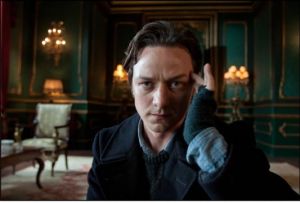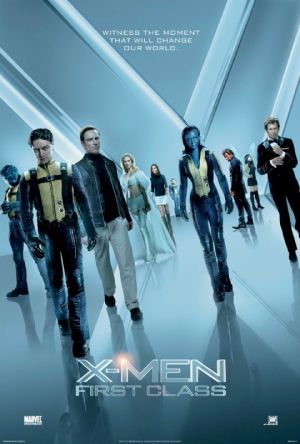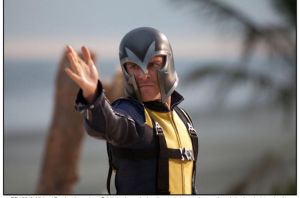Movies /
Comics Movie Reviews
X-Men: First Class
By Andy Frisk
June 3, 2011 - 00:35
After
X-Men The Last Stand (2006) the X-Men franchise was virtually dead.
X-Men Origins: Wolverine (2008) wasn’t much better, and even if I didn’t hate it as much as everyone else, it wasn’t exactly going to be the movie that would resurrect the X-Men franchise. No, no Phoenix Effect was bringing this franchise back to life. When
X-Men: First Class was announced, I rolled my eyes collectively with most members of the X-Nation. When the cast started to be unveiled though, and the setting (1960s Cuban Missile Crisis/Cold War Era) was revealed, my interest was piqued. After the casting of James McAvoy as Xavier, Michael Fassbender as Magneto, and Jennifer Lawrence as Mystique, I really got interested. As the trailers and teasers came, this film looked like it just might be what every die hard X-Men fan, I’m talking fans from at least the 1970s and 1980s, were looking for. This film had the potential to bring to life the story of two of sequential art’s most tragic and multidimensional characters: Charles Xavier and Erik Lehnsherr. Repeatedly referred to as the Martin Luther King Jr. and Malcolm X of the allegorical civil rights story that the X-Men’s tale has metaphorically become, the story of these two’s friendship, trials, and eventual split into two warring camps, set against the backdrop of the 1960s Cuban Missile Crisis, and freed from the ever present, highly marketable, and distracting to the telling of a good tale, shadow of Wolverine,
X-Men: First Class had the makings of a phenomenal film. I’m happy to say that it has lived up to its promise.
X-Men: First Class is phenomenal in every way. It is easily the best film based on Marvel Comics characters (even beating out this year’s
Thor, 2002's
Spider-Man, and 2008's
Iron Man), and is the closest thing the movie going public and comic book fan base has seen to compare with
The Dark Knight (2008). This statement isn’t made lightly.
X-Men: First Class is that good.
Many long term fans of the X-Men comic books, who know each and every character’s debut and nuance, will doubt my assertion that
X-Men: First Class is barely second only to
The Dark Knight. The seeming hodgepodge or mixed bag of characters assembled for this film and its story will grate against the X-Men purist’s sense of continuity. Left with the bitter aftertaste of
X-Men: The Last Stand, this is completely understandable. Again, at first I was even skeptical of the assembled cast of characters, which includes Havok, Beast, Banshee, Mystique, Emma Frost, and Sebastian Shaw. This assembly ends up making storytelling sense though in every way. Each of these characters represent personality and characterization complexities (and are much more visibly appealing--physically and mutant power wise) than the original cast as they appeared in the first issue of X-Men from September of 1963. Each character is well rounded, and effectively developed, considering the amount of time we get to know them. Each one has their own insecurities and strengths which contributes to the overall theme of the film. The two characters at the heart and soul of the tale though are Xavier (McAvoy) and Erik Lehnsherr (Fassbender).
X-Men: First Class is, at its heart, the story of these two men and the ideals that they represent: peaceful coexistence and cooperation (Xavier) and domination (Lehnsherr). These two men though are not as different minded as they might seem topically, at least in the outset, but both represent different worlds. Lehnsherr, a survivor of the Nazi death camps, is the realist. Xavier, son of privilege and higher education, is the idealist. To list all of the dichotomies that the two represent (liberalism vs. conservatism, idealism vs. realism, progressivism vs. traditionalism, etc. etc.) would be “too long to tell” and deprive the viewer of discovering them on their own, but they both are men, first and foremost, with the same desires and motivations in life. They simply have two very different ideas of how to go about achieving their goals. Regardless of their differences philosophically though, they become the best of friends who actually do care about each other and want to help each other until circumstances deem otherwise. Both these men are not perfect though. They are not perfect representations of their allegorically personified ideals, either. Xavier is idealistic almost to a fault, and Lehnsherr fails to see that he is on the verge of becoming what he hates the most, namely the fascist and racist Nazi that Sebastian Shaw (Lehnsherr’s childhood tormentor) represents. Xavier tries to reach Lehnsherr and vice versa, and they try convince each other of the flaws in their philosophies, but ultimately fail each other, as men so often do when pressed by desperate events, personal tragedies, and desires.
 |
By setting this tale of warring ideologies in the 1960s, the actual years of the creation of The X-Men as a comic book and concept, and against the backdrop of Cold War paranoia and the burgeoning Civil Rights movement, writers Sheldon Turner and Bryan Singer (of the first two X-Men movies’ fame) manage to capture, more than in any other Marvel Comics film adaptation, the spirit of the times and what Stan Lee and Jack Kirby were attempting to say culturally about this respective time period in American history. Turner and Singer manage to make the film relevant to today’s civil rights struggle as well though. When Xavier accidentally outs Hank McCoy (Beast) as a mutant to the shocked CIA agent that helps put the team together, McCoy responds, “You didn’t ask, so I didn’t tell.” Silver Age Marvel Comics were revolutionary in their portrayal of the then real world cultural issues and
X-Men: First Class captures this spirit of the times masterfully and makes it relevant to today’s cultural issues in spite of its Silver Age setting. This is what makes the film a work of cultural, and pop-cultural, brilliance. This is also what will make this film stand the test of time just as Lee and Kirby’s original storytelling does, regardless of how it messes with the sacredly long held continuity of the comic book itself.
As a film (and this might be where most readers of this review are going to get what they were looking for when they started reading—thank you for indulging me my musings and reading this far),
X-Men: First Class isn’t just all heady intelligence and philosophizing. It is a fantastic adventure filled with dazzling special effects, humor, great characterization, and acting. Fassbender and McAvoy have real chemistry and command of their onscreen friendship and scenes. The film is visually dazzling and recreates the Cold War era of the early 1960s quite well as far as dress, vehicles, and tech goes. There are also some really great (and I mean REALLY great) cameos in the film that are uproariously funny and poignant. The characters, with the exception of Xavier and Lehnsherr, are all college age, and they do some pretty funny college age things. The kids, soon to be thrust into the world of adulthood very quickly and violently, do have time to be kids though. Xavier himself even gets in on the fun early on by using some incredibly funny pick up lines while a student finishing his doctoral degree in genetics. Jennifer Lawrence (Mystique) is as breathtakingly beautiful as she is breathtakingly talented as an actress, and plays the soul torn between the ideals of Xavier and Lehnsherr’s masterfully, while still maintaining the nascent innocence of a girl her age in the 1960s who’s about to enter a whole new world of adult complexity. Kevin Bacon gives perhaps the most shockingly standout performance as Sebastian Shaw, leader of the Hellfire Club, who is dedicated to the total domination of the world and instigator of the Cuban Missile Crisis as a means to achieve his ends. He is the film’s true villain, and Bacon plays the part with frightening aplomb. He is evil, and he oozes evil in a way that instills fear (like any Nazi would) that leaves you in horror of his vileness. There is nothing hokey or silly about his Shaw. He is pure evil and far more tempting than any Dark Lord of The Sith.
X-Men: First Class is more than just a superhero film. Like its only serious peer in the genre,
The Dark Knight, this film makes you think, feel, and wonder. It is the most pure representation of what superheroes and the intellectually mature complexity of their allegorical tales mean. It’s the perfect combination of a summer blockbuster and a thought piece, and there is nothing better than this type of combination in a film. It leaves you wanting more from this cast in these roles and in this time period. Hopefully, it will spawn a whole new series of films that will live up to the standard that this film sets.
Rating: 10 /10
Last Updated: January 17, 2025 - 08:20




